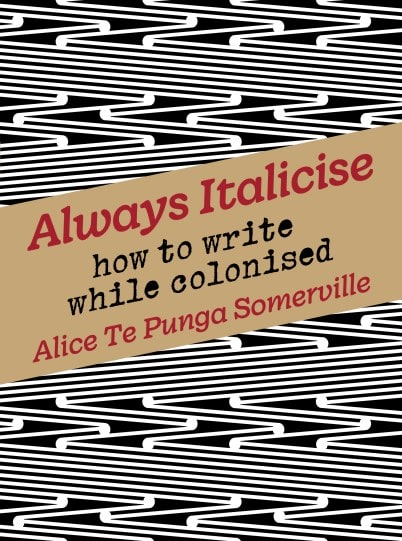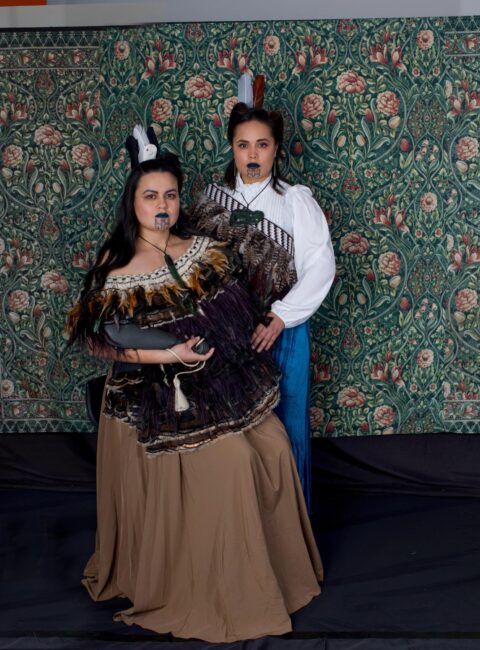Alice Te Punga Somerville’s debut poetry collection is incredibly moving and covers a range of themes, from love, death and grief, to language and what it means to be colonised, writes Waverly Taylor.
I first encountered Alice Te Punga Somerville in Tātai Whetū: Seven Māori Women Poets in Translation, which I read from cover to cover in the Women’s Bookshop one afternoon. It was her poem Rākau which stayed with me:
We know that carvers coax something or someone
Who’s already there in the wood
They remove small pieces of timber, one by one, until it’s ready.
We both know a language is waiting inside my tongue.
Alice is a widely published scholar, and her debut poetry collection, Always Italicise: how to write while colonised, travels across the loss and reclamation of reo; dives deep into love and death and grief; calls out racism; and intricately captures the act of writing itself.
Some of these poems are vulnerable, some joyful and tender, and others prompt us to think deeply about topics we often dance around the edges of. The final stanza of Too captures the tone:
All of me, all at once:
anger, frustration, cynicism, hope
and, in the centre as well as the outer reaches, love.
While much of the collection speaks to a loss of reo, it also affirms the unwavering bounty of indigenous thought. Alice converses with writers from across the Pacific: “I make lots of references and gestures and side-eyes to a wide range of texts and histories. It’s a way of speaking back to. . . violences and amazingness and legacies.”
Rākau, for instance, “responds to a poem that [Hone] Tuwhare wrote in response to the carver Taiapa. Tuwhare was thinking about the relationship between writing and carving. . . one way carvers think about carving wood is that the tupuna is already in there ready to be revealed. I started to think about how this might be a way to think about te reo. . . that [it] is already inside us who whakapapa Māori, so the process of learning is about bringing it out rather than pushing it in.”
This articulates the connection that I feel between my body and words. My encounters with language are often quiet and internal – knelt on the library floor flicking through a book, hunched over my laptop, skimming through my phone – yet I find reading and writing to be as physical as they are cerebral; being immersed in words is like going for a swim in winter – I emerge disoriented yet alert, changed in some way. Many of Alice’s poems speak to this intimacy. In first draft of a waiata tangi, the body becomes part of the writing process:
i’m lying on my tummy, skin pressing into a warm patch of blanket
working on the first draft of something i’ll never finish
Alice tells me, “Language can change our bodies. . . when I was carrying my daughter I heard a TED Talk about how newborn babies cry in a certain way that reflects the language their mother speaks, and I was like, ‘ugh, via the vibrations reaching her in my womb from my English-filled mouth I am already failing this kid and she hasn’t even been born yet!’ ”
Always Italicise places indigenous voices at its centre. The opening poem, Kupu rere kē, crystallises a statement of intent which gives the collection its title. Initially “outraged” after a friend was told to “italicise all of the foreign words in her poem”, Alice follows the advice:
Now all of my readers will be able to remember
which words truly belong in Aotearoa and which do not.
It’s a clever conceit. As the English words sway on the page, their te reo counterparts stand upright, firmly rooted upon paper.
For Alice, the appeal of poetry lies in its incompleteness: “it’s the ability to gesture, and refusing to finish a thought. . . that I enjoy about writing (and reading) poetry. So much of the experience of writing (and being and living) while colonised is about not having all the answers or not being able to articulate them.”
Silences abound in Always Italicise. In worst place to be a pilot, they open up like fresh wounds between each word:
nothing changes in the pacific:
except the fact we forget sometimes
in our own renamed islands
that we’re a part of it.
But silence can also be liberating; in these elongated spaces, the reader is able to breathe and roam. This sense of expansiveness suffuses the collection. Alice writes from other islands too. In Te Kawa a Māui farewell, she tells us:
Some days I long to be still.
But,
I’ve never been an ahi kā kind of girl.
Alice left Aotearoa at 24 to start a PhD in upstate New York/Cayuga nation. “I had thought I would go there, fill my kete, and return home forever. I had no idea. . . how I would come to understand being Māori in new ways, as I gained relationships with Māori people who are part of our immense and amazing and diverse diaspora.”
Māori “have always been mobile. . . [our] community is and always has been worldwide.”
Always Italicise is an ode to this mobility. Reading it is like crossing a vast body of water, with its ripples and undulations hinting at things that move beneath its surface. Each poem is a buoyant vessel, reminding us that words are kinetic and unfixed; they can carry us to other places and times – they have always been, and will continue to be, our waka.
PHOTOGRAPHY: Grant Maiden, Royal Society Te Apārangi

Always Italicise: how to write while colonised by Alice Te Punga Somerville (Auckland University Press, RRP $29.95).
RELATED ARTICLE: Who are going to be NZ’s next Ockham Book Award Winners








